From the Chicago Reader (December 2, 1988); also reprinted in my collection Essential Cinema. — J.R.
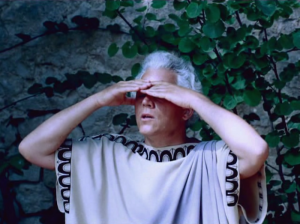
THE DEATH OF EMPEDOCLES
**** (Masterpiece)
Directed and written by Jean-Marie Straub and Daniele Huillet
With Andreas von Rauch, Howard Vernon, William Berger, Vladimir Baratta, Martina Baratta, and Ute Cremer.
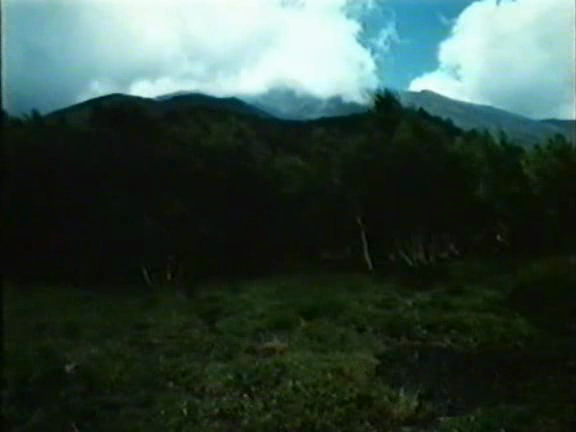
Three pretentious but relevant quotes: “Aesthetics are the ethics of the future” (Lenin). “To make a revolution also means to put back into place things that are very ancient but forgotten” (Charles Peguy). “When the Green of the Earth Will Shine Freshly for You” (Jean-Marie Straub and Daniele Huillet’s subtitle for The Death of Empedocles).
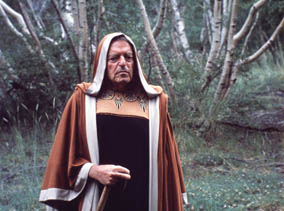
For spectators who don’t know what to do with their films, Jean-Marie Straub and Daniele Huillet offer a rigorous program that’s all work and no play — a grueling process of wrestling with intractable texts, often in languages that one doesn’t understand, without the interest provided by easy-to-read characters or compelling plots. But in fact every one of Straub-Huillet’s 15 films to date (10 features and 5 shorts) offers an arena of play as well as work, and opportunities for sensual enjoyment as well as analytical reflection. To find this arena of play and pleasure, one has to go beyond what we usually associate with the enjoyment of culture–beyond parameters that are usually limited by mutually exclusive notions of “art,” “entertainment,” “education,” and “scholarship,” notions that generally make us smile or groan in advance, regardless of what is placed in front of us. Read more
Written shortly after the Rotterdam Film Festival in February 2004 for Cinema Scope. It’s too bad that it hasn’t been possible for anyone (except for Ray Carney and his students, apparently) to see the first version of Shadows again since that festival, apart from the three short clips that Carney posted here. (The reasons for this have been discussed by Carney on his web site, but not, alas, by Gena Rowlands, Al Ruban, and/or the late Seymour Cassel in any comparable public forum, as far as I know. I should add that all the photographs here, apart from production stills, are from the second version.) — J.R.

In many respects, the most interesting movie I saw at the Rotterdam Film Festival last month was neither new nor a Golden Oldie, at least in any ordinary sense of either term, but a work that had been considered lost for almost half a century —- the original version of Shadows, John Cassavetes’ first feature, shot in the spring of 1957. Extensively reshot by Cassavetes two years later and re-edited into the film as we now know it, this shorter and rougher version was heralded by Jonas Mekas in 1960 as not only superior to the second, but a major aesthetic breakthrough, and we’ve had to wait 40-odd years to test the merits of his claim. Read more
My column for the June 2016 issue of Caimán Cuadenos de Cine. — J.R.
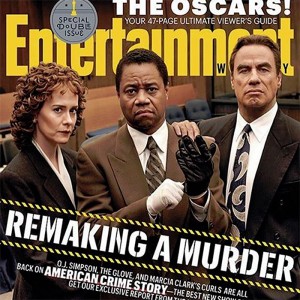
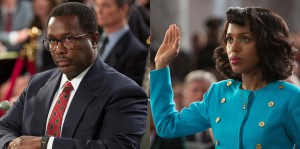
One of the frustrations about living in the U.S. these days is the virtual absence of TV news, replaced by a media circus built around the omnipresence of single events — the deaths of Frank Sinatra and Michael Jackson, or, this year, the U.S. Presidential primary elections. As with most Hollywood blockbusters, these circuses are designed to screen out the rest of the world, assuming that Americans are interested in sensation more than thought and can only focus on one momentous event at a time (which means that the delighted TV pundits can ignore the rest of the world with impunity). So it’s logical that everything Donald Trump utters or tweets gets more coverage than anything said by Barack Obama and that the same sound bites from Trump and the other candidates get endlessly recycled, thumbed over, and analyzed.
Consequently, it’s at once ironic and appropriate that the two most relevant and contemporary cinematic events that I’ve seen lately are both cable TV docudramas about media circuses of the 1990s, both of which offer certain insights into how a Frankenstein monster such as Trump was created thanks to the unholy marriage of celebrity culture and what subsequently became known as “reality TV”: a ten-part miniseries called American Crime Story: The People vs. Read more






